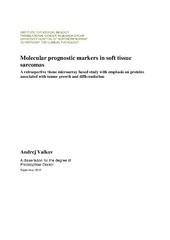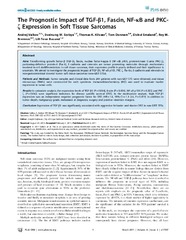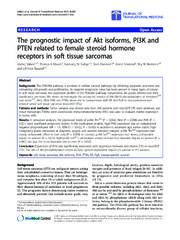| dc.contributor.advisor | Busund, Lill-Tove | |
| dc.contributor.author | Valkov, Andrey Yurjevich | |
| dc.date.accessioned | 2012-10-25T12:37:00Z | |
| dc.date.available | 2012-10-25T12:37:00Z | |
| dc.date.issued | 2012-09-06 | |
| dc.description.abstract | Soft tissue sarcomas (STS) is a group of malignant tumors arising from extraskeletal connective tissues. They are rare tumors and show high mortality rates. In our study, we sought to elucidate the prognostic impact of molecular factors participating in regulating tumor cell behaviour from benign to malignant and to unravel the impact of the tissue expression of these factors on patients’ survival. The study is based on tissue microarrays of STSs from 249 patients, from North Norway and Arkhangelsk region. Immunohistochemistry was used to evaluate marker expression. We have investigated prognostic impacts of 15 proteins. Among them, TGF-β, fascin, NF-κB, PKC-ζ, PI3K, p-Akt Thr308, Akt 2 and PGR have shown negative influence on patients’ survival, and impacts of TGF-β and PI3K were unfavorable regardless of age, gender or other characteristics of the patient. Interesting, PGR and ER expression by STS was gender-restricted, being invariably adverse in men and neutral or even favorable in female patients. Moreover, the site of Akt phosphorylation (Thr308 and Ser473) was shown to impart diverse prognostic values in a gender-dependent fashion. Our findings may help to identify subgroups of patients with aggressive tumors requiring adjuvant therapy which, due to relationship of many investigated proteins with female steroid hormone receptor proteins, could include specific endocrine treatment. | en |
| dc.description.popularabstract | I dette studiet har vi forsøkt å finne ut hvordan uttrykk av faktorer ansvarlige for tumor vekst og differensiering påvirker pasientens skjebne ved bløtvevssarkomer. Vi har brukt immunfargete tissue microarray multiblokker for å gjøre det. TGF-β og PI3K bl.a. visste mest dødelig påvirkning. Vi har også funnet at de fleste markører er kjønnsavhengig i sine aktiviteter og at steroid hormon reseptorer kan forsterke effekten. I tillegg fant vi ut at det samme protein Akt gir sarkomer forskjellig aggressivitetsgrad, avhengig av fosforyleringspunkt.
Våre funn vil hjelpe definere subgrupper av pasienter som trenger mer aggressiv behandling. Denne behandlingen kan inneholde bl.a. antihormonale medisiner. | en |
| dc.description | Paper 2 of this thesis is not available in Munin: <br/>2. Valkov A, Sorbye S, Kilvaer TK, Donnem T, Smeland E, Bremnes RM and Busund LT.: 'Estrogen receptor and progesterone receptor are prognostic factors in soft tissue sarcomas', International Journal of Oncology (2011), vol.38:1031-1040, available at <a href=http://dx.doi.org/10.3892/ijo.2011.920>http://dx.doi.org/10.3892/ijo.2011.920</a> | en |
| dc.identifier.uri | https://hdl.handle.net/10037/4578 | |
| dc.identifier.urn | URN:NBN:no-uit_munin_4315 | |
| dc.language.iso | eng | en |
| dc.publisher | Universitetet i Tromsø | en |
| dc.publisher | University of Tromsø | en |
| dc.rights.accessRights | openAccess | |
| dc.rights.holder | Copyright 2012 The Author(s) | |
| dc.rights.uri | https://creativecommons.org/licenses/by-nc-sa/3.0 | en_US |
| dc.rights | Attribution-NonCommercial-ShareAlike 3.0 Unported (CC BY-NC-SA 3.0) | en_US |
| dc.subject | VDP::Medical disciplines: 700::Clinical medical disciplines: 750::Oncology: 762 | en |
| dc.subject | VDP::Medisinske Fag: 700::Klinisk medisinske fag: 750::Onkologi: 762 | en |
| dc.subject | VDP::Medisinske fag: 700::Helsefag: 800 | no |
| dc.subject | VDP::Medical disciplines: 700::Health sciences: 800 | en |
| dc.title | Molecular prognostic markers in soft tissue sarcomas | en |
| dc.type | Doctoral thesis | en |
| dc.type | Doktorgradsavhandling | en |


 English
English norsk
norsk


